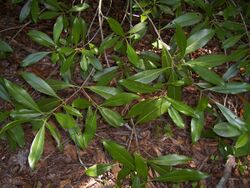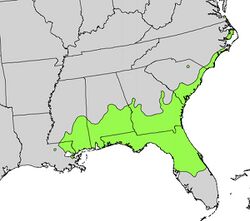Biology:Cartrema americana
| American olive | |
|---|---|

| |
| Leaves | |
| Scientific classification | |
| Kingdom: | Plantae |
| Clade: | Tracheophytes |
| Clade: | Angiosperms |
| Clade: | Eudicots |
| Clade: | Asterids |
| Order: | Lamiales |
| Family: | Oleaceae |
| Genus: | Cartrema |
| Species: | C. americanus
|
| Binomial name | |
| Cartrema americanus | |

| |
| US range | |
| Synonyms[2] | |
| |
Cartrema americana, commonly called American olive,[3] wild olive,[3] or devilwood,[3] is an evergreen shrub or small tree[3] native to southeastern North America, in the United States from Virginia to Texas , and in Mexico from Nuevo León south to Oaxaca and Veracruz.[4][5]
Cartrema americana was formerly classified as Osmanthus americanus. Following the discovery that Osmanthus was polyphyletic,[6] it was transferred to the segregate genus Cartrema together with Osmanthus floridanus[7] and five Asian species.[8]
Cartrema americana grows to 4–7 m (13–23 ft), rarely to 11 m (36 ft) tall. The leaves are 5–14 cm (2.0–5.5 in) long and 2–4 cm (0.79–1.57 in) broad, with an entire margin. Its flowers, produced in early spring, are small (1 cm long), white, with a four-lobed corolla and have a strong fragrance. The fruit is a globose dark blue drupe 6–15 mm (0.24–0.59 in) diameter, containing a single seed.[9][10][11]
It is cultivated as an ornamental plant in gardens for its fragrant flowers.
References
- ↑ "NatureServe Explorer 2.0 - Osmanthus americanus, Wild Olive". https://explorer.natureserve.org/Taxon/ELEMENT_GLOBAL.2.127879/Osmanthus_americanus. Retrieved 6 May 2020.
- ↑ 2.0 2.1 "Cartrema americana (L.) G.L.Nesom". Plants of the World Online. Royal Botanic Gardens, Kew. https://powo.science.kew.org/taxon/urn:lsid:ipni.org:names:77128534-1. Retrieved 2019-03-28.
- ↑ 3.0 3.1 3.2 3.3 Bailey, L.H.; Bailey, E.Z.; the staff of the Liberty Hyde Bailey Hortorium (1976). Hortus third: A concise dictionary of plants cultivated in the United States and Canada. New York: Macmillan. ISBN 978-0-02-505470-7. https://archive.org/details/hortusthirdconci00bail.
- ↑ {{citation | mode = cs1 | title = Cartrema americana | work = Germplasm Resources Information Network (GRIN) | url = | publisher = [[Organization:Agricultural Research ServAgricultural Research Service (ARS), United States Department of Agriculture (USDA) | access-date = 10 January 2018 }}
- ↑ Kew World Checklist of Selected Plant Families, Osmanthus americanus
- ↑ Shi-Quan Guo, Min Xiong, Chun-Feng Ji, Zhi-Rong Zhang, De-Zhu Li and Zhi-Yong Zhang, Molecular phylogenetic reconstruction of Osmanthus Lour. (Oleaceae) and related genera based on three chloroplast intergenic spacers, Plant Syst Evol (2011) 294:57–64
- ↑ Nesom, G.L. 2012. Synopsis of American Cartrema (Oleaceae). Phytoneuron 2012-96: 1–11.
- ↑ José Ignacio De Juana Clavero, Cambios nomenclaturales en la sección Leiolea (Spach) P. S. Green, del género Osmanthus Lour. (Oleaceae), Bouteloua 22: 28-39 (XI-2015)
- ↑ Weaver, R. E. (2003). Botany Section. Tri-ology 42 (6): 1-16 pdf file
- ↑ Centenary College Virtual Arboretum, Louisiana: Osmanthus americanus
- ↑ Huxley, A., ed. (1992). New RHS Dictionary of Gardening. Macmillan ISBN:0-333-47494-5.
Wikidata ☰ {{{from}}} entry
 |


